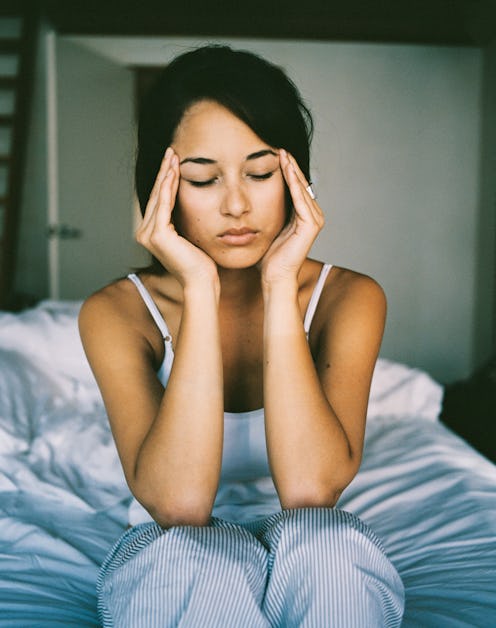Wellness
5 Tell-Tale Signs You Grind Your Teeth At Night
It could be the culprit behind those headaches, for one.

Grinding your teeth is one of those pesky habits that’s difficult to stop doing unless you’re reminded to relax your jaw muscle. (That’s a friendly reminder to unclench your jaw right now!) Although you can be unintentionally doing it all day, sometimes it’s hard to know — so learning how to tell if you grind your teeth at night can help you figure out the culprit behind that jaw pain.
Grinding your teeth — also known as bruxism — is actually very common, and it’s been exacerbated by the pandemic (it is partially brought on by stress, after all). “Bruxism is a parafunctional habit, which means it’s something you do with your teeth besides the intended nature of chewing,” cosmetic dentist Dr. Sophya Morghem, D.M.D., tells Bustle. It’s generally damaging to your teeth (especially when done long term) and can lead to unpleasant consequences (like tightness or headaches).
It’s not that you knowingly do it: According to Los Altos-based dentist Dr. Joseph Field, D.D.S., grinding your teeth isn’t typically a conscious act. And sometimes sleep conditions can lead to bruxism. “A reason we see bruxism, especially at nighttime, is [because of] undiagnosed sleeping disorders like sleep apnea,” Field says. In this case, he explains you’re not breathing properly at night, which causes your lower jaw to push forward to try and open your airway up. You can also be grinding your teeth during workouts or while waiting in rush hour traffic, says Field.
Of course, since you’re asleep, it’s tricky to tell if you’re grinding your teeth at night. But it’ll often manifest in certain ways — here, experts share the tell-tale signs you’re grinding your teeth while you sleep.
1Tight Jaw Muscle
If you ever grind your teeth at night, odds are you’ve felt muscle pain as a result. According to Field, however, if you’re grinding your teeth in the beginning of your sleep, you may not experience that symptom at all. But, if you tend to brux in the hours leading up to your wake time, then this is a common sign of grinding your teeth at night, he says.
2Damaged Teeth
If you regularly grind your teeth at night, Field says you can increasingly wear down the enamel, which can lead to chipping and cracking of your teeth. According to Morghem, the worst-case scenario would be the damage from ultimately fracturing your teeth. One solution to prevent this is wearing a mouth guard at night, which can serve as a barrier between your teeth; however, it needs to be properly fitted since an over-the-counter one can lead to more grinding if it isn’t snug, Field says.
3Headaches
Morghem says that some people (typically those who grind their back teeth) really use their temporalis muscles, or their temples, to grind and clench. In that case, you’ll experience headaches in that region when you wake up, she explains, since the pain can radiate to the sides of the face.
4Face Soreness
Especially since you’re making your temporalis muscles work on overdrive while grinding, it can transform the pain into a soreness that’s felt on the face, says Morghem. “The tightness of the jaw muscle on the cheek [can lead to] pain to touch on the cheek if there’s pressure applied.”
5Exacerbated TMD
Grinding your teeth can definitely exacerbate temporomandibular disorders (TMD), which affect the jaw and result in chronic facial pain. These symptoms include pain, clicking, popping, and restricted mouth opening, says Field. “For patients who've been grinding for years, the muscle that allows them to close their jaw [becomes] big and bulky because they've been using it and overusing it all these years,” says Morghem.
If your symptoms of grinding are very severe, Morghem says Botox could be one of the most helpful treatments. “Botox therapy actually stops that muscle from contracting to a degree, so [the treatment] will act as a dimmer switch and not allow that person to contract as hard as they were before.” That said, it’s a temporary fix, so she recommends getting the treatment every three to four months.
Studies referenced:
Borrero-Lopez O, Pajares A, Constantino PJ, Lawn BR. A model for predicting wear rates in tooth enamel. J Mech Behav Biomed Mater. 2014 Sep;37:226-34. doi: 10.1016/j.jmbbm.2014.05.023. Epub 2014 Jun 5. PMID: 24953823.
Commisso, M. S., Martínez-Reina, J., & Mayo, J. (2014). A study of the temporomandibular joint during bruxism. International journal of oral science, 6(2), 116–123. https://doi.org/10.1038/ijos.2014.4
Lal SJ, Weber KK. Bruxism Management. [Updated 2020 Oct 3]. In: StatPearls [Internet]. Treasure Island (FL): StatPearls Publishing; 2021 Jan-. Available from: https://www.ncbi.nlm.nih.gov/books/NBK482466/
Martynowicz, H., Smardz, J., Michalek-Zrabkowska, M., Gac, P., Poreba, R., Wojakowska, A., Mazur, G., & Wieckiewicz, M. (2019). Evaluation of Relationship Between Sleep Bruxism and Headache Impact Test-6 (HIT-6) Scores: A Polysomnographic Study. Frontiers in neurology, 10, 487. https://doi.org/10.3389/fneur.2019.00487
Oksenberg A, Arons E. Sleep bruxism related to obstructive sleep apnea: the effect of continuous positive airway pressure. Sleep Med. 2002 Nov;3(6):513-5. doi: 10.1016/s1389-9457(02)00130-2. PMID: 14592147.
Tan EK, Jankovic J. Treating severe bruxism with botulinum toxin. J Am Dent Assoc. 2000 Feb;131(2):211-6. doi: 10.14219/jada.archive.2000.0149. PMID: 10680389.
Wieckiewicz, M., Paradowska-Stolarz, A., & Wieckiewicz, W. (2014). Psychosocial aspects of bruxism: the most paramount factor influencing teeth grinding. BioMed research international, 2014, 469187. https://doi.org/10.1155/2014/469187
Yap, A. U., & Chua, A. P. (2016). Sleep bruxism: Current knowledge and contemporary management. Journal of conservative dentistry : JCD, 19(5), 383–389. https://doi.org/10.4103/0972-0707.190007
Experts:
Dr. Joseph Field, D.D.S., a Los Altos-based dentist
Dr. Sophya Morghem, D.M.D., cosmetic dentist